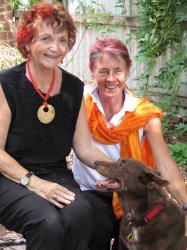
From: Listening 2 Lesbians
To: Facebook Press and Hard Questions at Facebook (hardquestions@fb.com, press@fb.com)
Dear Facebook Press:
Listening 2 Lesbians is a blog with a mission to report on discrimination and violence against lesbians. You may not be aware, but discrimination and violence against lesbians, because of our sexual orientation and because of our female bodies, is rampant in today’s world. From no-platforming to corrective rape, to job discrimination, to murder, we are constantly aware of the silencing of our community and the attempts to control and harm our bodies because we are lesbians. Because of this, we have been deeply disturbed to learn that there have been a rash of post deletions and bans by your company for women that post status updates with the word “dyke” in their posts.
Perhaps you are not aware of the history of the word “dyke”, or of lesbian culture, or of the act of reclaiming slurs from the oppressor to be used as acts of self-empowerment and identity by minorities. Dyke has been and can be used as a derogatory term (hate speech) to attack same-sex attracted females. We hope at Facebook you acknowledge that all such speech should be banned from public spaces. However, dyke is also a word that has been reclaimed by the lesbian community to represent our lesbian pride, sisterhood and power as female loving females.
We are deeply disturbed that lesbians and women showing support for our community, are being banned for expressing their love and respect for our culture. We are also deeply disturbed that women are being silenced when they express their views on what it means to be a dyke. This is a conversation for lesbians only and should not be controlled or manipulated by anyone outside of our community.
Here are examples of posts that have been deleted and women who have been banned for using the word dyke in a post. Be aware that we are not convinced you will accept emails with images attached, so we will simply quote the text. Please read our blog, Facebook Has a Problem With Dykes, at https://listening2lesbians.com/2017/06/24/facebook-has-a-problem-with-dykes/ for full images and information on the situation.
Quotes from women that were deleted by Facebook and/or caused the woman to be blocked/banned:
“I love that there’s a band of dykes that plays at the local farmer’s market. Like, how perfect is that?? It’s total perfect.”
“I LOVE DYKES!!!!”
“Only lesbians are dykes. Only females can be lesbians. We are still here.”
“When dyke marches were still for dykes.” (With historical image of a dyke march)
“People need to quit rewriting history. Dykes do things. #visibilitymatters” (With historical image of Storme DeLaverie, the lesbian who started the Stonewall riots.)
“Does self identifying as a DYKE get you banned on Facebook experiment.” (It did)
Again, this is just a small set of examples. Please visit our blog for more information.
In an NPR article entitled, From Hate Speech To Fake News: The Content Crisis Facing Mark Zuckerberg, a spokesperson for your company told NPR:
“It’s OK to use racial slurs when being self-referential. A black person can say things like “my niggers.” But no one can use a slur to attack an individual or group. That’s prohibited. A white person cannot use the word “nigger” to mock or attack blacks. Blacks can’t use “crakkker” (in whatever spelling) to offend whites.” (http://www.npr.org/sections/alltechconsidered/2016/11/17/495827410/from-hate-speech-to-fake-news-the-content-crisis-facing-mark-zuckerberg)
Clearly, there has been at the very least, a misuse of the Community Standards at Facebook, and at worse, a misuse of power and position by Facebook employees. This is why we have some hard questions for management at Facebook:
- If a Community Operations Team employee is responsible for banning and deleting all reported posts, can FB monitor if an employee, or group of employees is showing political or social biases in their decision making? For example, is it possible for an employee to get away with targeting a select group of people for deletion or banning, even if their posts don’t violate Community Standard?
- What groups or organizations are influencing the content and wording of Community Standards? Have they demonstrated lesbophobic and/or misogynistic language or tendencies?
- It appears as if certain women who are part of certain Facebook groups have been targeted more than others. Is the new AI you are using to fight terrorism and hate-speech (The Online Civil Courage Initiative) also capturing feminist and lesbian-only groups in its net and considering them a cluster?
- If the new AI that you are using has algorithms that can understand context, and you are using this AI on Facebook users in lesbian and women’s communities, why is it unable to differentiate between a pro-lesbian dyke post and a post where dyke is being used as hate speech?
- If all AI flagged posts are also seen and evaluated by a Community Operations Team employee, why are they also not able to read context?
- Will Facebook investigate the issues we have brought forth to you today?
- If you find that an individual employee, or group of employees, has been abusing their position at Facebook to target and silence lesbians and other women they do not agree with, will Facebook tell the communities affected and issue a public apology?
Thank you for your time.
Liz & Lisa
Listening 2 Lesbians
www.listening2lesbians.com
















